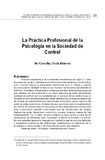| dc.rights.license | http://creativecommons.org/licenses/by-nc-sa/3.0/ve/ | |
| dc.contributor.author | De Carvalho, Paulo Roberto | |
| dc.date.accessioned | 2015-02-20T13:58:21Z | |
| dc.date.available | 2015-02-20T13:58:21Z | |
| dc.date.issued | 2015-02-20T13:58:21Z | |
| dc.identifier.issn | 0798-3069 | |
| dc.identifier.uri | http://www.saber.ula.ve/handle/123456789/39802 | |
| dc.description.abstract | Foucault caracteriza a las sociedades occidentales del siglo XX como
disciplinarias, es decir, ubicadas en el sistema de poder disciplinario. La disciplina,
para Foucault, implica la preparación interminable para el trabajo y consiste
en una sucesión de fases vividas en las diversas instituciones que atienden al
individuo. Al analizar críticamente la contemporaneidad, Gilles Deleuze propone
que estamos en una transición a un nuevo esquema de poder denominado
sociedad de control, que se caracteriza por el ejercicio de los poderes que se
difunden en la sociedad sin depender de las instituciones. Deleuze considera que
los medios de comunicación son instrumentos apropiados para el ejercicio del
poder en estas condiciones. Al mismo tiempo que hemos visto el surgimiento de
los medios de comunicación en la producción de subjetividad de prácticamente
toda la población, también observamos que las instituciones del antiguo
régimen de poder disciplinario sobreviven, aunque muestren signos de mal
funcionamiento. Por lo tanto, en este contexto se hace visible la crisis de las
instituciones de diferentes tipos, incluyendo la familia, la escuela y la prisión.
En este complejo escenario, marcado por nuevas formas de ejercicio del poder
y acelerados cambios en las instituciones, cuestionamos la integración de la
psicología en este proceso y las funciones de control que adquiere. | es_VE |
| dc.language.iso | es | es_VE |
| dc.rights | info:eu-repo/semantics/openAccess | |
| dc.subject | Psicología | es_VE |
| dc.subject | Contemporaneidad | es_VE |
| dc.subject | Control | es_VE |
| dc.title | La práctica profesional de la psicología en la sociedad de control | es_VE |
| dc.title.alternative | The professional practice of psychology in the society of control | es_VE |
| dc.type | info:eu-repo/semantics/article | |
| dc.description.abstract1 | Foucault characterized the societies of the XX century as disciplinary
proceedings, in system of disciplinary power. They understand the discipline as
the endless preparation for work, which involves a succession of phases that
are lived in the various institutions that the individual attends. Following a critical
aspect of contemporary life, Gilles Deleuze proposed that we are transitioning
to a new power scheme named control society, characterized by the exercise of
powers that are spread into the society without relying on the institutions. Deleuze
considers that the mass media are appropriate instruments for the exercise of
power under these conditions. At the same time, we have seen the rise of the
media in the production of subjectivity in large scale; we also observed that the
institutions of the old regime of disciplinary power survive even though showing
signs of malfunctioning. Thus, in this context a crisis becomes visible: the crisis
of institutions of different types, including the family, the school and the prison. In
this complex scenario, marked by new forms of exercise of power and accelerated
changes in the institutions, we question the way in which Psychology integrates
to this process and the functions of control that it acquires. | es_VE |
| dc.description.colacion | 289-302 | es_VE |
| dc.description.frecuencia | trimestral | |
| dc.subject.centroinvestigacion | Centro de Investigaciones en Ciencias Humanas (HUMANIC) | |
| dc.subject.facultad | Facultad de Humanidades y Educación | es_VE |
| dc.subject.keywords | Psychology | es_VE |
| dc.subject.keywords | Contemporaneity | es_VE |
| dc.subject.publicacionelectronica | Revista Fermentum | |
| dc.subject.seccion | Revista Fermentum: Artículos | es_VE |
| dc.subject.thematiccategory | Artes y Humanidades | es_VE |
| dc.subject.tipo | Revistas | es_VE |
| dc.type.media | Texto | es_VE |


